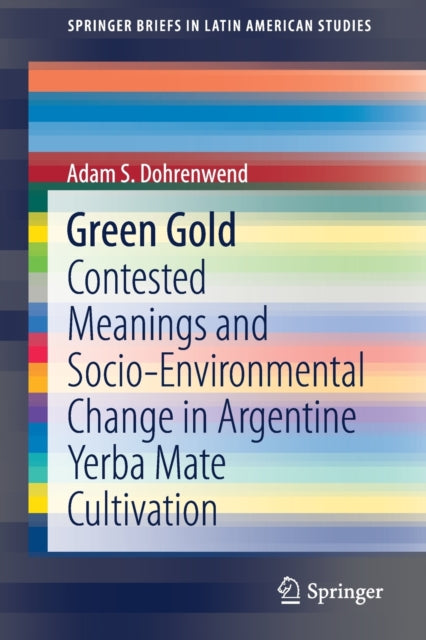Adam S. Dohrenwend
Green Gold: Contested Meanings and Socio-Environmental Change in Argentine Yerba Mate Cultivation
Green Gold: Contested Meanings and Socio-Environmental Change in Argentine Yerba Mate Cultivation
YOU SAVE £7.88
- Condition: Brand new
- UK Delivery times: Usually arrives within 2 - 3 working days
- UK Shipping: Fee starts at £2.39. Subject to product weight & dimension
Bulk ordering. Want 15 or more copies? Get a personalised quote and bigger discounts. Learn more about bulk orders.
Couldn't load pickup availability
- More about Green Gold: Contested Meanings and Socio-Environmental Change in Argentine Yerba Mate Cultivation
This book examines the externalization of cost in the production of Argentine yerba mate, using a political-ecological lens to reveal the realities of consumption in a globalized economy. The true costs of production are borne by children, impoverished laborers, and the environment in Argentinas Misiones Province.
Format: Paperback / softback
Length: 51 pages
Publication date: 05 October 2021
Publisher: Springer Nature Switzerland AG
This book delves into the intricate dynamics of externalizing costs in the production of Argentine yerba mate, a stimulant-rich infusion cherished by indigenous communities for centuries. In the context of our increasingly globalized economy, understanding the far-reaching consequences of our actions becomes challenging. By employing a political-ecological lens, inspired by the insights of Robert Sack and Ian Cook, we can undertake a comprehensive analysis that geographically reconstructs supply chains and unveils the realities of consumption.
Yerba mate has firmly established itself as an integral part of Argentine society and identity, with yerba mate processors actively seeking to expand their exports on a global scale. However, the true costs of production are borne disproportionately by the children, impoverished laborers, and the fragile ecosystem of Argentina's Atlantic Rainforest. These consequences of modernity, coupled with the efforts of an NGO to address them, are explored and evaluated in this book.
The production of yerba mate in Argentina's Misiones Province, considered the heartland of yerba mate cultivation, exposes the harsh realities faced by these vulnerable groups. Children, often forced into labor to support their families, endure long working hours and hazardous working conditions, putting their health and well-being at risk. Meanwhile, impoverished laborers, often drawn to the industry due to limited employment opportunities, face low wages, poor working conditions, and limited access to basic rights and resources.
The Atlantic Rainforest, a UNESCO World Heritage Site, plays a critical role in yerba mate production. However, the intensive harvesting of yerba mate trees, coupled with the expansion of agricultural activities and urbanization, has led to significant environmental degradation. Deforestation, soil erosion, and water pollution threaten the biodiversity and ecological balance of this unique ecosystem, endangering the livelihoods of indigenous communities and the long-term sustainability of yerba mate production.
To address these challenges, an NGO has emerged as a driving force for change. Working closely with local communities and stakeholders, the NGO has implemented sustainable farming practices, promoted fair labor practices, and advocated for the conservation of the Atlantic Rainforest. Their efforts have led to the creation of community-based enterprises, providing alternative income sources and promoting sustainable livelihoods.
Through a combination of empirical research, case studies, and theoretical analysis, this book sheds light on the complex web of externalizing costs in the production of Argentine yerba mate. It highlights the urgent need for a more holistic and sustainable approach to consumption, one that recognizes the interconnectedness of human actions, the environment, and social justice. By adopting a political-ecological lens, we can strive towards a future where the consequences of our consumption are more equitable, environmentally responsible, and socially just.
In conclusion, this book offers a valuable contribution to the growing body of literature on the politics of consumption and the environmental consequences of globalization. It provides a poignant reminder of the human costs associated with the pursuit of economic growth and highlights the importance of adopting a more sustainable and equitable approach to consumption. By understanding the realities of externalizing costs in the production of Argentine yerba mate, we can inspire a broader conversation about the role of consumption in shaping our world and work towards a more sustainable and just future.
Weight: 114g
Dimension: 235 x 155 (mm)
ISBN-13: 9783030820107
Edition number: 1st ed. 2021
This item can be found in:
UK and International shipping information
UK and International shipping information
UK Delivery and returns information:
- Delivery within 2 - 3 days when ordering in the UK.
- Shipping fee for UK customers from £2.39. Fully tracked shipping service available.
- Returns policy: Return within 30 days of receipt for full refund.
International deliveries:
Shulph Ink now ships to Australia, Belgium, Canada, France, Germany, Ireland, Italy, India, Luxembourg Saudi Arabia, Singapore, Spain, Netherlands, New Zealand, United Arab Emirates, United States of America.
- Delivery times: within 5 - 10 days for international orders.
- Shipping fee: charges vary for overseas orders. Only tracked services are available for most international orders. Some countries have untracked shipping options.
- Customs charges: If ordering to addresses outside the United Kingdom, you may or may not incur additional customs and duties fees during local delivery.


